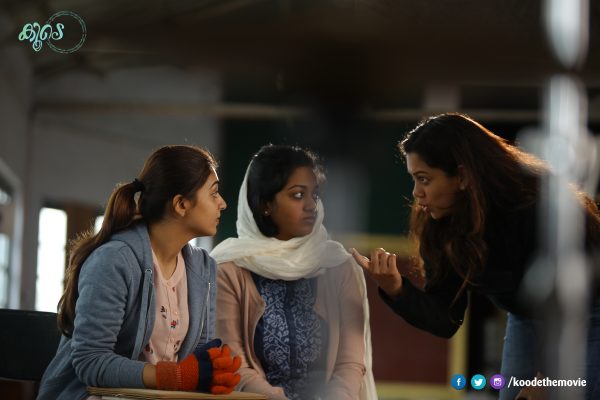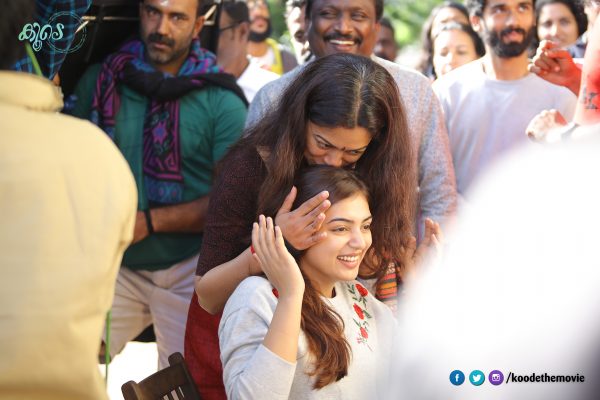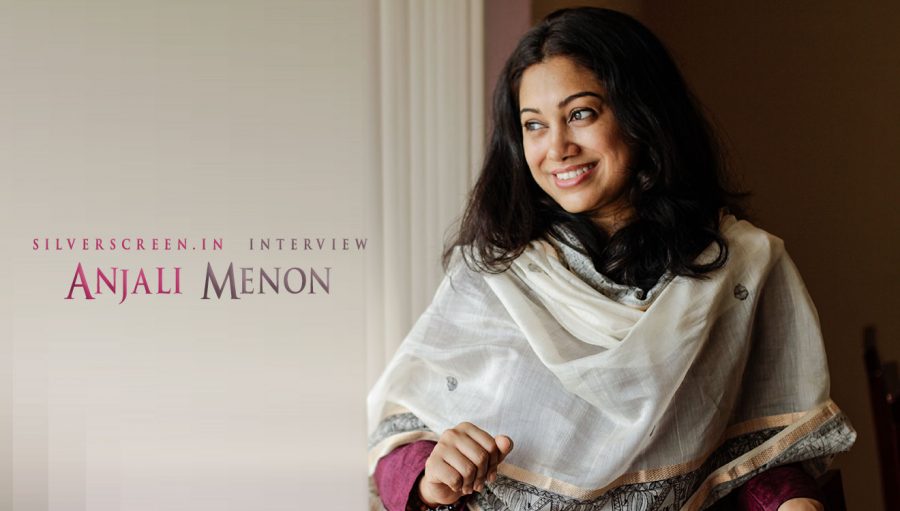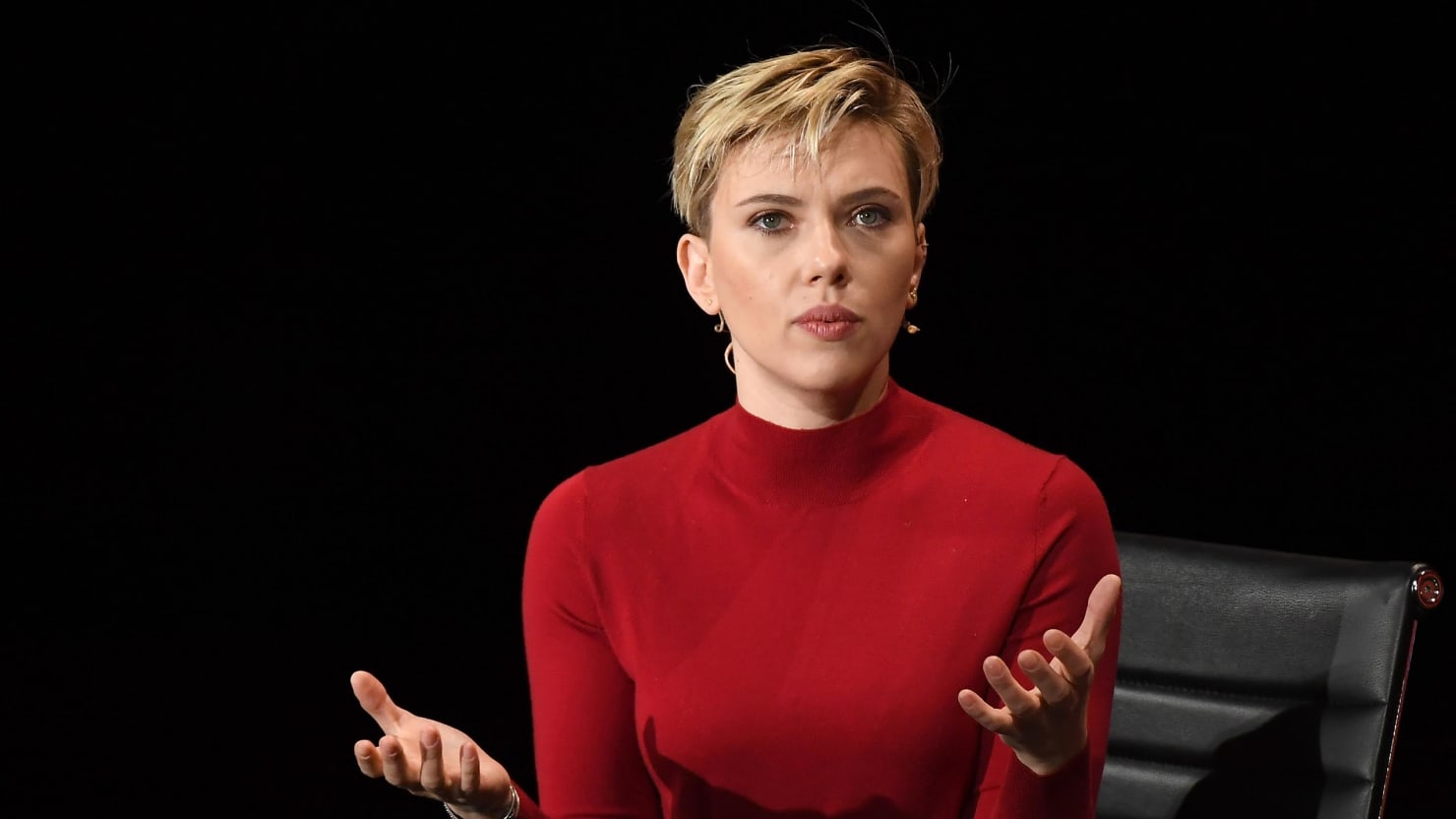It’s been a hectic month for Anjali Menon, wrapping up work on Koode, an adaptation of Sachin Kundalkar’s 2014 Marathi film, which releases today. It’s the first time she’s adapting someone’s story; till now, others have worked using hers – think Ustad Hotel and the other versions of Bangalore Days. She’s been at the dubbing studio, giving interviews, sharing all she can about her labour of love. Despite that, when Silverscreen catches up with her two days before the release, she laughs easily, cracks a joke or two, and is in the moment.
You tend to respect a filmmaker who never forgets the person within. Someone who flaunts the ordinariness of her life – getting drenched just before an important interview, raining affection on Nazriya during the shoot…
It is this very everydayness that makes people feel warm and happy after watching her films — the ones she wrote and those she directed. Be it Manjaadikuru, her segment in the anthology Kerala Café, Ustad Hotel, Bangalore Days, or the forthcoming Koode, they all boast a strong people connect, a certain positivity, and characters that look at the world with an innocence and wide-eyed wonder. Because, as Anjali says, “That’s probably what my world looks like!”
Excerpts from an interview with the filmmaker.
In a fast-changing world, your films showcase warmth and positivity. Where does that come from?
I really can’t think of an off-the-cuff answer, but I’ll put it this way: I write what I would like to see on screen. At the end of the day, people remember how you make them feel. My work is towards that. Emotion is the fuel that drives people, and I try and create a world that is not make-believe, but real, for me.
In an earlier interview, you had mentioned how you infuse your characters with traits of the actors playing them. How does that work?
I don’t mean the actors will play themselves on screen; there’s a clear distinction between who they are and what they do on screen. But I lend the characters some traits they are familiar with. It gives them a connection, so to say. Through that, they explore the character further. For instance, Dulquer Salmaan is nothing like Bangalore Days’ Arjun, but they share a love for motorbikes and a fetish for speed.
It helps that I strike a bond with my actors before shooting. I rarely meet them first on set. Even when I narrate a story, it is more to see what they feel about it, to see who they are. I need to know my actors, and they need to let me into a certain space where I can probe them, and where they can ask me questions. A lot happens between a director and an actor, and you must build a trust foundation.

Anjali_Nazriya_03
You mention that writing is a process you enjoy but struggle to put ideas to paper. Plus, you write between tasks. Has the process got any easier with time?
That’s been the same. The struggle is because I want a scene to be effortless and natural. Some scenes write themselves. They don’t have to convey a key idea or move the story forward; they are what I call ‘feel scenes’. For instance, in Ustad Hotel, the ‘desert rain’ dialogue between the grandfather (Thilakan) and grandson (Dulquer Salmaan) was organic. (“Have you seen it raining in a desert,” the grandfather asks, and says, “I have. On the way to a dargah. Before we reached Ajmer, it started raining. As you stand there in the rain, you realise jannath (heaven) is not really far away.” The scene was shot in a car, in the midst of heavy rain) It wrote itself, and I wondered if the director would like it. He filmed it so beautifully. Later, when many told me about the ‘feel’ of the scene, I realised that people respond well to these.
Casting is one aspect of filmmaking you get right every time. And, how did you manage to find two young boys to play Prithviraj, across different time periods? (Manjaadikuru and Koode)
Ha, that’s a lot of hard work. And, while I was doing it firsthand during Manjaadikuru; for Koode, I had an excellent team of assistant directors who searched for months for the right actor. They scouted schools, workshops… Finally, one of them spotted Zubin (Koode) boarding a bus and brought him to me. He looked interesting, but I wanted to see if he could be Prithvi. I got him to play a concentration game and when he was immersed in it, watched him. I was impressed, but I finalised him after a camp we had with the entire crew.
So, if you have to search for a third child to play a young Prithviraj?
Oh my god, I hope I don’t have to do that for some more time. I even made Prithvi send me photos of his hand, because I wanted someone with similar features!
You always say that once a film is made, it belongs to the world. That way, what is your hope for Koode?
Often, people are so hard on each other, in real life, on social media. I want the film to tempt people to recognise sensitivity and sensitive people. They are a treasure.
People watch your films with a certain expectation; they are not usually surprised. Has any film surprised you?
I watch all films across genres and am not closed to anything. But I remember when watching Dead Man Walking, a film about a rapist sentenced to death, I wondered why I was there. When the film ended, I realised it was important to understand that there can be remorse.
If Nazriya’s Divya paints the glass panes in Bangalore Days, in Koode, she traces patterns with her fingers…do you recognise a pattern there?
I’ll have to thank my cinematographers for translating my thoughts. That said, I always believe that lonely people express themselves using objects around them. In Koode, you’ll get a strong idea of what her character is through the things she draws. In Bangalore Days, Das (Fahad Faasil) and Divya (Nazriya) share no communication; she paints as a form of expression.
How do you react to the intense studying of your movies and their innumerable interpretations?
This is a part of my journey too, in a very personal way. Some can separate their personal and professional selves. I am very personally invested. These are my characters. Of course, being so invested draws its energy; but I don’t know how to be less connected.

13
One word commonly used to describe you is graceful. Has it been difficult to stay that way in the role you’ve chosen in your profession?
I was discussing this with someone today and I’m happy to say it again. There are different kinds of leaders. Some lead from the front and yell others into action. But, it’s not my style and I don’t believe that I have to change myself to be able to lead. I empower my team. There is a thing such as shepherding leadership. It helps people realise what is expected of them, and brings them up to their potential. I like going to the sets, I don’t like to yell, walk out and be a diva. I like to watch carefully and nudge people in the right direction. I think it is important to be happy on the sets. For me, the journey is almost more important as the end result. More importantly, the actors need that space. They are doing serious work, and I have to insulate them. I am not going to allow work to transform me to the level that I am not there in it anymore.
Recommended
You wish future where the prefix of woman is not used when referring to filmmaker or artistes. What is your hope for women in cinema?
This is not something that will happen automatically, we have to make it happen. This is a change we have to be. We have to create an environment within ourselves, in our spaces, where there is equal opportunity for all genders, a certain professional environment to work in. It has to happen film by film, step by step. This is like a management structure — practice from the ground and policy from the top. What the Women in Cinema Collective, of which I am a part of, does is self-mandate and try and point out gaps where there can be lapses, and make them inclusive. These rules are outdated and we need to bring them up to speed to include women on the sets today.



